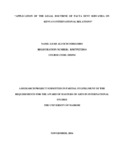Application of the Legal Doctrine of Pacta Sunt Servanda on Kenya’s International Relations
| dc.contributor.author | Odhiambo, Leah A | |
| dc.date.accessioned | 2017-01-05T07:59:15Z | |
| dc.date.available | 2017-01-05T07:59:15Z | |
| dc.date.issued | 2016 | |
| dc.identifier.uri | http://hdl.handle.net/11295/99070 | |
| dc.description.abstract | The principal of pacta sunt servanda means contracts and their clauses are laws which bring binding force between parties. Every party to a contract must keep his promise and fulfil his obligation. Under the Vienna Convention on the Law of Treaties every state has a duty to abide by its treaty obligations hence under the pacta sunt servanda rule: every treaty in force is binding upon the parties to it and must be performed by the parties in good faith. Article 2 (6) of the Constitution of Kenya 2010 provides that any treaty or convention ratified by Kenya shall form part of the law of Kenya under the constitution, further Article 2(5) provides that the general rules of international Law shall form part of the Law of Kenya. This research intends to look at the legal doctrine of pacta sunt servanda; enforcement of treaty in Kenya and its implication in Kenya‟s International Relations. This will be achieved by analyzing the doctrine of pacta sunt servanda, treaty enforcement in Kenya and how Kenya‟s International Relations is affected. | en_US |
| dc.language.iso | en | en_US |
| dc.publisher | University of Nairobi | en_US |
| dc.rights | Attribution-NonCommercial-NoDerivs 3.0 United States | * |
| dc.rights.uri | http://creativecommons.org/licenses/by-nc-nd/3.0/us/ | * |
| dc.title | Application of the Legal Doctrine of Pacta Sunt Servanda on Kenya’s International Relations | en_US |
| dc.type | Thesis | en_US |



